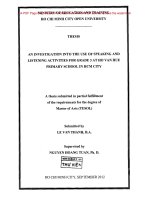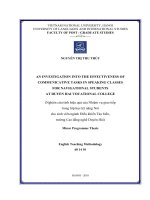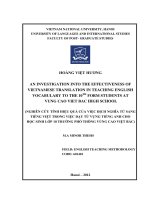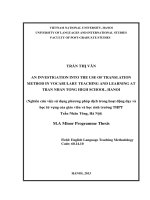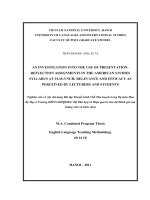Investigation into the use of data analytics in political campaigns
Bạn đang xem bản rút gọn của tài liệu. Xem và tải ngay bản đầy đủ của tài liệu tại đây (7.35 MB, 116 trang )
Information Commissioner’s Office
Investigation into the
use of data analytics
in political campaigns
A report to Parliament
6 November 2018
Table of contents
Commissioner’s message ................................................................... 4
Executive summary .......................................................................... 7
1. Introduction ............................................................................. 14
1.1 Background ........................................................................... 14
1.2 The scale of the investigation................................................... 15
1.3 The importance of the investigation .......................................... 18
2. Regulatory enforcement action ................................................... 20
2.1
Failure to properly comply with the Data Protection Principles .... 20
2.2
The relationship between the GDPR and the Data Protection Act
1998 .......................................................................................... 20
2.3 Failure to properly comply with the Privacy and Electronic
Communications Regulations ......................................................... 21
2.4 Section 55 offences of the Data Protection Act 1998 ................... 21
2.5 This report ............................................................................ 21
3. Summary of investigations and regulatory action taken ................. 23
3.1 Political parties ...................................................................... 23
1
3.2 Cambridge Analytica (CA), Global Science Research (GSR) and the
obtaining and use of Facebook data ............................................... 26
3.3 The relationship between Aggregate IQ (AIQ), SCLE and CA ........ 39
3.4 The relationship between Cambridge Analytica (CA) and Leave.EU
................................................................................................. 43
3.5 Relationship between Leave.EU and Eldon Insurance Ltd (Eldon),
Big Data Dolphins and the University Of Mississippi (UoM) case ......... 44
3.6 The relationship between AggregateIQ (AIQ), Vote Leave and other
Leave campaigns ......................................................................... 49
3.7 Vote Leave ............................................................................ 52
3.8 BeLeave and Veterans for Britain ............................................. 53
3.9 The Remain campaign............................................................. 54
3.10 The university sector, Cambridge University and the Cambridge
University Psychometric Centre ..................................................... 55
3.11 Data brokers ........................................................................ 59
4. Summary of regulatory action .................................................... 62
4.1 Notices of Intent and Monetary Penalties ................................... 62
4.2 Enforcement Notices ............................................................... 62
4.3 Criminal prosecutions ............................................................. 63
2
4.4 Regulatory actions .................................................................. 63
5. Next steps ............................................................................... 64
6. Annex i: Leave EU Notice of Intent £60,000 ................................. 65
Annex ii: Leave EU Notice of Intent £15,000 ...................................... 79
Annex iii: Eldon Insurance (trading as Go Skippy) Notice of Intent
£60,000 ........................................................................................ 91
Annex iv: Eldon Insurance Ltd Preliminary enforcement notice ........... 104
Annex v: List of 30 organisations that formed the main focus of our
investigation ................................................................................ 112
Annex vi: Report clarifications and corrections, 21 December 2018 ..... 114
3
Commissioner’s message
When we opened our investigation into the use of data analytics for
political purposes in May 2017, we had little idea of what was to come.
Eighteen months later, multiple jurisdictions are struggling to retain
fundamental democratic principles in the face of opaque digital
technologies.
The DCMS Select Committee is conducting a comprehensive inquiry into
Disinformation. The EU says electoral law needs to be updated to reflect
the new digital reality, initiating new measures against electoral
interference. A Canadian Parliamentary Committee has recommended
extending privacy law to political parties and the US is considering
introducing its first comprehensive data protection law.
Parliamentarians, journalists, civil society and citizens have woken up to
the fact that transparency is the cornerstone of democracy. Citizens can
only make truly informed choices about who to vote for if they are sure
that those decisions have not been unduly influenced.
The invisible, ‘behind the scenes’ use of personal data to target political
messages to individuals must be transparent and lawful if we are to
preserve the integrity of our election process.
We may never know whether individuals were unknowingly influenced to
vote a certain way in either the UK EU referendum or the in US election
campaigns. But we do know that personal privacy rights have been
compromised by a number of players and that the digital electoral ecosystem needs reform.
My office’s report to Parliament beings the various strands of our
investigation up to date. We intended our investigation to be
comprehensive and forensic. We have identified 71 witnesses of interest,
4
reviewed the practices of 30 organisations and are working through 700
terabytes – the equivalent of 52 billion pages – of data.
We have uncovered a disturbing disregard for voters’ personal privacy.
Social media platforms, political parties, data brokers and credit reference
agencies have started to question their own processes – sending ripples
through the big data eco-system.
We have used the full range of our investigative powers and where there
have been breaches of the law, we have acted. We have issued monetary
penalties and enforcement notices ordering companies to comply with the
law. We have instigated criminal proceedings and referred issues to other
regulators and law enforcement agencies as appropriate. And, where we
have found no evidence of illegality, we have shared those findings
openly.
Our investigation uncovered significant issues, negligence and
contraventions of the law. Now we must find the solutions. What can we
do to ensure that we preserve the integrity of elections and campaigns in
future, in order to make sure that voters are truly in control of the
outcome?
Updated data protection law sets out legal requirements and it should be
government and regulators upholding the law. Whilst voluntary initiatives
by the social media platforms are welcome - a self-regulatory approach
will not guarantee consistency, rigour or public confidence.
A Code of Practice for use of personal data in campaigns and elections,
enshrined in law - will give our powers a sharper edge, providing clarity
and focus to all sectors, and send a signal from parliament to the public
that it wants to get this right.
I have also called for the UK Government to consider whether there are
any regulatory gaps in the current data protection and electoral law
5
landscape to ensure we have a regime fit for purpose in the digital age.
We are working with the Electoral Commission, law enforcement and
other regulators in the UK to increase transparency in election campaign
techniques.
The General Data Protection Regulation (GDPR) was designed to regulate
the use of personal data in the internet age. It gives data protection
authorities the tools to take action where breaches of this kind occur.
Data protection agencies around the world must work with other relevant
regulators and with counterparts in other jurisdictions to take full
advantage of the law to monitor big data politics and make citizens aware
of their rights.
This is a global issue, which requires global solutions. I hope our
investigation provides a blueprint for other jurisdictions to take action and
sets the standard for future investigations.
Elizabeth Denham
UK Information Commissioner
6
Executive summary
The Information Commissioner announced in May 2017 that she was
launching a formal investigation into the use of data analytics for political
purposes after allegations were made about the ‘invisible processing’ of
people’s personal data and the micro-targeting of political adverts during
the EU Referendum.
The investigation has become the largest investigation of its type by any
Data Protection Authority - involving online social media platforms, data
brokers, analytics firms, academic institutions, political parties and
campaign groups.
This is the summary report of our investigation. It covers the areas we
investigated, our findings and our actions to date. Where we have taken
regulatory action, the full details of our findings are – or will be – set out
in any final regulatory notices we issued to the parties being investigated.
A separate report, Democracy Disrupted? Personal Information and
Political Influence was published in July 2018, covering the policy
recommendations from the investigation.
One of the recommendations arising from this report was that the
Government should introduce a statutory code of practice for the use of
personal data in political campaigns and we have launched a call for views
on this code.
We will continue to pursue any actions still outstanding at the time of
writing. Regulatory action taken to date:
7
Political parties
We sent 11 warning letters requiring action by the main political
parties, backed by our intention to issue assessment notices for
audits later this year.
We have concluded that there are risks in relation to the processing of
personal data by many political parties. Particular concerns include the
purchasing of marketing lists and lifestyle information from data
brokers without sufficient due diligence, a lack of fair processing and
the use of third party data analytics companies, with insufficient
checks around consent.
Cambridge Analytica and SCLE Elections Limited
Cambridge Analytica (CA) is a trading name of SCLE Elections Ltd
(SCLE) and so the responsibilities of the companies often
overlapped. Both are subsidiaries of SCLE Group (SCL). For ease of
reading we will be referring to all the company entities using
Cambridge Analytica.
We issued an enforcement notice requiring the company to deal
properly with Professor David Carroll’s Subject Access Request.
Despite the company having entered into administration, we are
now pursuing a criminal prosecution for failing to properly deal with
the enforcement notice.
While we are still conducting our investigations and analysis of the
evidence we have recovered so far, we’ve already identified serious
breaches of data protection principles and would have issued a
substantial fine if the company was not in administration.
We are in the process of referring CA to the Insolvency Service.
8
We issued Facebook with the maximum monetary penalty of
£500,000 available under the previous data protection law for lack
of transparency and security issues relating to the harvesting of
data. We found that Facebook contravened the first and seventh
data protection principles under the Data Protection Act 1998
(DPA1998).
We are in the process of referring other outstanding issues about
Facebook’s targeting functions and techniques used to monitor
individuals’ browsing habits, interactions and behaviour across the
internet and different devices to the Irish Data Protection
Commission, as the lead supervisory authority for Facebook under
the General Data Protection Regulation (GDPR).
Leave.EU and Eldon Insurance
We issued a notice of intent to fine both Leave.EU and Eldon
Insurance (trading as GoSkippy) £60,000 each for serious breaches
of the Privacy and Electronic Communications Regulations 2003
(PECR), the law which governs electronic marketing. More than one
million emails were sent to Leave.EU subscribers over two separate
periods which also included marketing for GoSkippy services,
without their consent. This was a breach of PECR regulation 22.
We also issued a notice of intent to fine Leave.EU £15,000 for a
separate, serious breach of PECR regulation 22 after almost
300,000 emails were sent to Eldon Insurance (trading as GoSkippy)
customers containing a Leave.EU newsletter.
We have issued a preliminary enforcement notice to Eldon
Insurance under s40 of the DPA1998, requiring the company to
9
take specified steps to comply with PECR regulation 22. We will
follow this up with an audit of the company.
We are investigating allegations that Eldon Insurance Services
Limited shared customer data obtained for insurance purposes with
Leave.EU. We are still considering the evidence in relation to a
breach of principle seven of the DPA1998 for the company’s overall
handling of personal data. A final decision on this will be informed
by the findings of our audit of the company.
We have also begun a wider piece of audit work to consider the use of
personal data and data sharing in the insurance and financial sectors.
Relationship between AggregateIQ, Vote Leave and other leave
campaigns
We issued an Enforcement Notice to AggregateIQ to stop processing
retained UK citizen data.
We established the contractual relationship between AggregateIQ
and the other related parties. We also investigated their access to
UK personal data and its legality. And we engaged with our
regulatory colleagues in Canada, including the federal Office of the
Privacy Commissioner and the Office of the Information and Privacy
Commissioner, British Columbia to assist in this work.
Remain campaign
We are still looking at how the Remain side of the referendum
campaign handled personal data, including the electoral roll, and
will be considering whether there are any breaches of data
protection or electoral law requiring further action. We investigated
the collection and sharing of personal data by Britain Stronger in
10
Europe and a linked data broker. We specifically looked at
inadequate third party consents and the fair processing statements
used to collect personal data.
Cambridge University
We conducted an audit of the Cambridge University Psychometric
Centre and made recommendations to ensure that the university
makes improvements to its data protection and information security
practices, particularly in the context of safeguarding data collected
by academics for research.
We also recommended that Universities UK work with all
universities to consider the risks arising from use of personal data
by academics. They have convened a working group of higher
education stakeholders to consider the wider privacy and ethical
implications of using social media data in research, both within
universities and in a private capacity.
Data brokers
We issued a monetary penalty in the sum of £140,000 to data
broker Emma’s Diary (Lifecycle Marketing (Mother and Baby)
Limited), for a serious breach of the first principle of the Data
Protection Act 1998.
We issued assessment notices to the three main credit reference
agencies - Experian, Equifax and Call Credit - and are in the process
of conducting audits.
We have issued assessment notices to data brokers Acxiom Ltd,
Data Locator Group Ltd and GB Group PLC.
We have looked closely at the role of those who buy and sell
personal datasets in the UK. Our existing investigation into privacy
11
issues raised by their services has been expanded to include their
activities in political campaigns.
12
172
30
71
40
ICO
investigators
2
22
organisations
identified.
organisations formed the main
focus of the investigation.
witnesses
of interest.
31
warrants executed
monetary penalties
enforcement notices
documents
seized.
700
85
information
notices issued
1
criminal
prosecution
pieces of equipment
seized including servers.
terabytes of data seized,
equivalent to 52.5 billion pages.
13
1. Introduction
1.1 Background
In early 2017, a number of media reports in The Observer newspaper
alleged that a company, Cambridge Analytica (CA), worked for the
Leave.EU campaign during the EU referendum, providing data services
that supported micro-targeting of voters. In March 2017, the
Commissioner stated that the office would begin a review of evidence as
to the potential risks arising from the use of data analytics in the political
process.
Following that review of the available evidence, we announced in May
2017 that we were launching a formal investigation into the use of data
analytics in political campaigns - in particular, whether there had been
any misuse of personal data and, therefore, breaches of data protection
law during the referendum. At the same time, we committed to producing
a policy report, which was published in July 2018.1
The subsequent investigation identified a number of additional strands of
enquiry that required consideration. Three other ongoing ICO operations,
investigating sectors such as credit reference agencies and data brokers,
also revealed evidence of relevance to this investigation. The investigation
ultimately involved various online platforms, data brokers, analytics firms,
academic institutions, political parties and campaign groups. The nature
of modern campaigning techniques and data flows meant that some of
these organisations of interest to the investigation are located outside the
UK.
/>1
14
1.2 The scale of the investigation
This is the most complex data protection investigation we have ever
conducted. Not only has it required us to draw on the full range of
regulatory tools available to the ICO, but it has been a catalyst for our
request for additional powers. These additional powers were granted by
Parliament in the Data Protection Act 2018 (DPA2018).
It is exceptional in that many of the key players have offered their
evidence publicly in various parliamentary and media forums around the
world, and at different times. Our investigation has had to react to and
address an abundance of claims and allegations played out in public. We
have also had to respond to further offers of information from
whistleblowers and former employees at some of the organisations under
investigation, and this has on occasion caused us to review, reconsider
and rethink elements of the evidence previously presented by those
organisations.
At times it has required the full-time focus of more than 40 ICO
investigators. A significant number of external experts have been
contracted to provide legal and forensic IT recovery support for various
aspects of the investigation.
The investigation has identified a total of 172 organisations that required
initial engagement, of which 30 have formed the main focus of our
investigation. These include political parties, data analytics companies and
major online platforms.
Similarly, we spoke to nearly 100 individuals of interest, including through
formal interviews, and we continue to engage with people who hold
information of relevance to the investigation.
15
The aim was to understand how political campaigns use personal data to
micro-target voters with political adverts and messages, the techniques
used, and the complex eco-system that exists between data brokerage
organisations, social media platforms and political campaigns and parties.
Key areas explored and analysed through the investigation included:
the nature of the relationship between social media platforms,
political parties and campaigns and data brokers in respect of the
use of personal data for political purposes;
the legal basis that political parties and campaigns, social media
platforms and data brokers are using to process personal data for
political purposes;
the extent to which profiling of individuals is used to target
messages/political adverts at voters;
the type and sources of the data sets being used in the profiling and
analysis of voters for political purposes;
the technology being used to support the profiling and analysis of
voters for political purposes;
how political parties and campaigns, social media platforms and
data brokers are informing individuals about how their information
is being used; and
voters’ understanding of how their personal data is being used to
target them with political messaging and adverts.
We have used the full range of our powers under both the current and
previous data protection legislation, including:
serving information notices to request provision of information from
organisations in a structured way (with changes to legislation, these
can now be issued to ‘persons’ as well as data controllers);
16
serving enforcement notices requiring specific action to be taken by
a data controller in order to comply with data protection legislation;
attending premises to carry out investigations and examine and
seize material relevant to our investigation (backed by a warrant to
do the same if access is unreasonably refused); and
issuing monetary penalty notices to sanction data controllers for
breaches of the law.
A number of organisations freely co-operated with our investigation,
answered our questions and engaged with the investigation. However,
others failed to provide comprehensive answers to our questions,
attempted to undermine the investigation or refused to cooperate
altogether. In these situations, we used our statutory powers to make
formal demands for information.
Our investigation also had a considerable inter-agency and international
dimension. In the UK we have worked with the Electoral Commission and
the National Crime Agency and have taken advice from the Insolvency
Service and the Financial Conduct Authority.
Several disclosures to us suggested offences beyond the scope of the
ICO’s legal remit, and we made appropriate referrals to law enforcement
in the UK and overseas. Several of the key subjects of our investigation
are also subject to investigation by other data protection authorities and
law enforcement and so we worked with our counterparts in Canada and
the United States (US) to co-ordinate elements of our investigation. We
have legal gateways to share and receive information through the DPA
2018 and that has assisted with our investigation and also those of other
data protection authorities. We also have links to data protection
authorities worldwide through our links to the Global Privacy Enforcement
Network (GPEN).
17
We are interrogating 700 terabytes of data - the equivalent of 52.2 billion
pages - taken from machines both voluntarily surrendered and seized, as
well as information stored on cloud servers.
1.3 The importance of the investigation
Rapid developments in technology and social media over the last 15 years
have, inevitably, led to data-driven campaigns, as political parties seek to
follow commercial organisations by taking advantage of increasingly
sophisticated marketing techniques to engage with voters.
The fact that political parties and campaigns all over the world have
invested heavily in digital messaging in recent years shows the potential
to reach more people in an efficient, targeted and accessible manner, for
a fraction of the cost of more traditional methods.
This brings a number of advantages. Social media provides
unprecedented opportunities to engage hard-to-reach groups in the
democratic process on issues of particular importance to them. However,
these developments have been so rapid that many voters are unaware of
the scale and context in which they are being targeted. The public have
the right to expect that political messaging is conducted in accordance
with the law.
Our investigation focused particularly on the data protection principle of
transparency. If voters are unaware of how their data is being used to
target them with political messages, then they won’t be empowered to
exercise their legal rights in relation to that data and the techniques being
deployed, or to challenge the messages they are receiving.
18
Without a high level of transparency and trust amongst citizens that their
data is being used appropriately, we are at risk of developing a system of
voter surveillance by default.
It is impossible for us to say whether the data techniques used by either
side in the UK EU referendum campaign impacted on the result. However,
what is clear is that we are living in an era of closely fought elections,
where the outcome is likely to be decided on the votes of a small number
of people. There are significant gains to be made by parties and
campaigns which are able to engage individual voters in the democratic
debate and on areas of public policy that are likely to influence the
outcome.
There is no turning back the clock – digital elections are here to stay. We
need to work on solutions to protect the integrity of our democratic
processes. We believe our call for a statutory code to clearly set out the
law, along with our enforcement action, our engagement with political
parties, campaigns, social media platforms and Universities UK for reform
of the political eco-system are all positive steps.
19
2. Regulatory enforcement action
The investigation is considering potential criminal offences as well as
wider regulatory issues.
We focused on the following main issues:
2.1 Failure to properly comply with the Data Protection Principles
Under the previous law, anyone who processes personal data must
comply with eight principles of the DPA1998, which state that personal
information must be:
fairly and lawfully processed;
processed for limited purposes;
adequate, relevant and not excessive;
accurate and up to date;
not kept for longer than is necessary;
processed in line with individuals’ rights;
secure; and
not transferred to other countries without adequate protection.
2.2 The relationship between the GDPR and the Data Protection Act
1998
The DPA1998 was replaced by the GDPR and the Data Protection Act 2018
(DPA2018) on 25 May 2018. Throughout this investigation, consideration
has been given to all relevant legislation, including transitional provisions.
20
2.3 Failure to properly comply with the Privacy and Electronic
Communications Regulations
These regulations sit alongside data protection legislation. They give
people specific privacy rights in relation to electronic communications.
There are specific rules on marketing calls, emails, texts and faxes;
cookies (and similar technologies); keeping communications services
secure; and customer privacy as regards traffic and location data,
itemised billing, line identification and directory listings.
2.4 Section 55 offences of the Data Protection Act 1998
It is a criminal offence to knowingly or recklessly, without the consent of
the data controller, obtain or disclose personal data or the information
contained within it. Additionally, it is an offence to procure the disclosure
to another person of the information contained in personal data. It is also
an offence for someone to sell data if it has been obtained in those
circumstances.
We have also examined the evidence we recovered to identify where
other criminal offences may have been committed; this included criminal
offences related to the failure to comply with information notices or
enforcement notices issued by the ICO, as well as other offences.
We looked at organisations and also the actions of individuals controlling
them during the relevant periods.
2.5 This report
This report summarises the areas we investigated, actions taken and any
areas where our work needs to continue. The full details of our findings
21
are – or will be – set out in any final regulatory notices we issue to the
parties subject to investigation.
Some of these investigations have resulted in the publication of a notice
of intent, where the Commissioner expresses her intention to impose a
monetary penalty. See our Communicating Regulatory Activity policy. The
affected parties then have a chance to respond to the notice of intent,
after which a final decision will be made.
22
3. Summary of investigations and regulatory action
taken
3.1 Political parties
Our investigators interviewed representatives and reviewed the practices
of the main political parties in the UK. Parties were asked to provide
information about how they obtain and use personal data, and the steps
they take to comply with data protection legislation.
We concluded that there are risks in relation to the processing of personal
data by all the major parties. We have issued letters to the parties with
formal warnings about their practices. Of particular concern are:
the purchasing of marketing lists and lifestyle information from data
brokers without sufficient due diligence around those brokers and
the degree to which the data has been properly gathered and
consented to;
a lack of fair processing information;
the use of third-party data analytics companies with insufficient
checks that those companies have obtained correct consents for use
of data for that purpose;
assuming ethnicity and/or age and combining this with electoral
data sets they hold, raising concerns about data accuracy;
the provision of contact lists of members to social media companies
without appropriate fair processing information and collation of
social media with membership lists without adequate privacy
assessments.
23
The formal warnings included a demand for each party to provide Data
Protection Impact Assessments (DPIAs) for all projects involving the use
of personal data.
Under the GDPR, data controllers are required to complete a DPIA
wherever their intended processing is ‘likely to result in high risk’ to the
rights and freedoms of data subjects.
Because parties are using special category data (relating political opinions
and ethnicity), as well as automated decision making and profiling, they
would therefore be required undertake a DPIA under the GDPR.
A DPIA gives a systematic and objective description of the intended
processing and considers the risk to people’s personal data – not only the
compliance risk of the organisation involved. The ICO provides written
advice to organisations about their DPIAs and can issue warnings where
we consider projects would potentially breach the GDPR.
The formal warnings were issued to 11 political parties (Conservatives,
Labour, Lib Dems, Greens, SNP, Plaid Cymru, DUP, Ulster Unionists,
Social Democrat, Sinn Féin and UKIP) detailing the outcome of our
investigation and the steps that needed to be taken. We required them to
report on the actions taken within three months.
Processing personal data in the context of political campaigning can be
complex and we require additional confirmation on the parties’ data
activities, particularly in light of changes to the law. We will be issuing
assessment notices and carrying out audits of the parties from January
2019.
24


